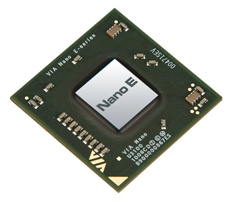
Con il comunicato stampa di seguito allegato, VIA Technologies ha annunciato una nuova linea di cpu, la VIA Nano E-Series, nell'ambito della famiglia Nano.
I nuovi chip, il cui target di impiego è rappresentato dai sistemi embedded, supportano in maniera nativa il software a 64-bit e offrono buone prestazioni in virtualizzazione (VIA VT virtualization); di conseguenza sono perfetti per il prossimo Sistema Operativo Windows Embedded Standard 7.
Inizialmente la gamma VIA Nano E-Series sarà composta dalle varianti denominate L3050, U3100, U3300, U3500 e U3400, tutte caratterizzate da una frequenza di clock che va da un massimo di 1.8Ghz (L3050) a un minimo di 800MHz (U3400) e da una potenza dissipata in condizioni di idle pari a 100mW per tutti i modelli, ad eccezione del processore più veloce, siglato L3050, per il quale il consumo di potenza in tali condizioni è pari a 500mW.
La nuove cpu possono operare in abbinamento a memoria centrale di tipo DDR2, o DDR3, e hanno un FSB pari a 800MHz; sono dotate di una gestione avanzata del consumo di potenza che permette di minimizzare i costi energetici e della tecnologia VIA PadLock Security Engine, che abilita la cifratura in hardware dei dati.
Al momento VIA Technologies ha inviato i primi sample ai suoi partner tecnologici.

[Immagine ad alta risoluzione]

[Immagine ad alta risoluzione]

Taipei, Taiwan, 22 April 2010 - VIA Technologies, Inc, a leading innovator of power efficient x86 processor platforms, today announced the VIA Nano E-Series processor, bringing native 64-bit software support, virtualization capabilities and extended longevity support to embedded markets.
The move to 64-bit software architecture is an essential transition for the future of the embedded industry. Forthcoming operating systems such as Windows Embedded Standard 7 will be able to leverage a 64-bit software eco system that provides up to double the amount of data a CPU can process per clock cycle. This translates in to greater ease in manipulating large data sets and an overall performance boost compared to non-native x64 architectures.
"VIA Nano E-Series processors have been designed to facilitate the shift towards new technologies that will shape the embedded industry for years to come," said Daniel Wu, Vice President, VIA Embedded Platform Division, VIA Technologies, Inc. "The VIA Nano E-Series will mean that technologies such as 64-bit computing and virtual software deployment will become the norm, not the exception for tomorrow’s embedded system developers."
The VIA Nano E-Series also supports VIA VT virtualization technology, allowing legacy software and applications to be used in virtual scenarios without impacting on performance. And as with all VIA processors, the VIA PadLock Security Engine offers hardware based data encryption standards that meet widely accepted international standards.
Visitors to the VIA Technologies booth at ESC Silicon Valley 2010 will be able to see the VIA Nano E-Series in action. Join VIA at Embedded System Conference 2010, April 27 – 29, San Jose, McEnery Convention Center, Booth No.1238.
For more details, please visit:
http://www.via.com.tw/en/company/events/esc2010/index.jsp
VIA Nano E-Series Highlights
Available at speeds from 800MHz to 1.8GHz, VIA Nano E-Series processors have guaranteed product longevity of seven years and are built on the successful 64-bit, superscalar architecture that powers the VIA Nano 3000 Series and 2000 Series processors.
All VIA Nano E-Series processors are fully compatible with a range of fully integrated media system processors including the VIA VX800, VIA VX855 and forthcoming VIA VX900 and VIA VN1000 digital media chipsets, offering exceptional hardware acceleration of the most demanding HD video codecs and industry leading 3D graphics capabilities.
- World's most power-efficient out-of-order x86 architecture
- Full support for 64-bit operating systems
- High-performance superscalar processing
- Most efficient speculative floating point algorithm
- Full CPU virtualization support
- Advanced power and thermal management
- Leading-edge hardware security features
- Pin-to-pin compatibility with VIA Nano, VIA C7 and VIA Eden Processors
- DDR2 and DDR3 memory support